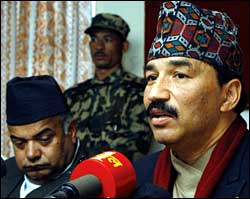 The government will grant amnesty to Maoists who surrender by 12 February, Information Minister Kamal Thapa said on Thursday. "We have concrete plans for their rehabilitation at a centre in Tanahu," he told a press meet. The government also issued a list of guns it will buy for cash, which is the first hint that the rebels have captured sophisticated weapons. The army will pay Rs 30,000 for an Israeli Galil assault rifle, an M-16 will fetch Rs 50,000 and handing over a 81mm field gun is worth Rs 200,000 cash.
The government will grant amnesty to Maoists who surrender by 12 February, Information Minister Kamal Thapa said on Thursday. "We have concrete plans for their rehabilitation at a centre in Tanahu," he told a press meet. The government also issued a list of guns it will buy for cash, which is the first hint that the rebels have captured sophisticated weapons. The army will pay Rs 30,000 for an Israeli Galil assault rifle, an M-16 will fetch Rs 50,000 and handing over a 81mm field gun is worth Rs 200,000 cash. The government is hemmed in from all sides and beleaguered, but spokesman Kamal Thapa did not show any indication he was worried at his press meet on Thursday.
The prime minister is out of the country, the Maoists killed 25 security personnel in landmine attacks in one week, US Assistant Secretary of State for South Asia, Christina Rocca, delivered a tough message on human rights violations by the army, the political parties launched a new improved anti-king agitation, a Maoist strike has brought education to a halt and put 1.5 million students out of school.
But Thapa tried to seize the initiative with a timebound offer of amnesty to Maoists who surrender, guaranteeing them and their families safety in a special rehabilitation camp in Tanahu. If they surrender with their weapons, they even get a cash bonus.
Thapa even spelled out plans for the medical treatment of injured rebels, higher education and even employment guarantees. Legal cases filed against them will be withdrawn and the ex-Maoists will be allowed to take part in political activities.
"The idea is to give the rebels a chance to live a normal life if they are willing to quit the Maoist bloc," Thapa said. "They must realise they have no chance of winning. The social, economic, political and international scenario is not in their favour."
As long as he was at it, Thapa also criticised political parties for getting the students agitated and demonstrating against the king. Asked about the two student leaders detained and charged with sedition, he said they would be prosecuted according to the law. Students blocked roads and set fire to tyres in continuing protests for the release of their leaders.
Thapa labeled Christina Rocca's visit to Nepal as 'routine', but admitted that she has raised the issue of human rights violations in meetings with government and military officials. He added: "But we assured her that we were doing our very best to prevent such violations."


